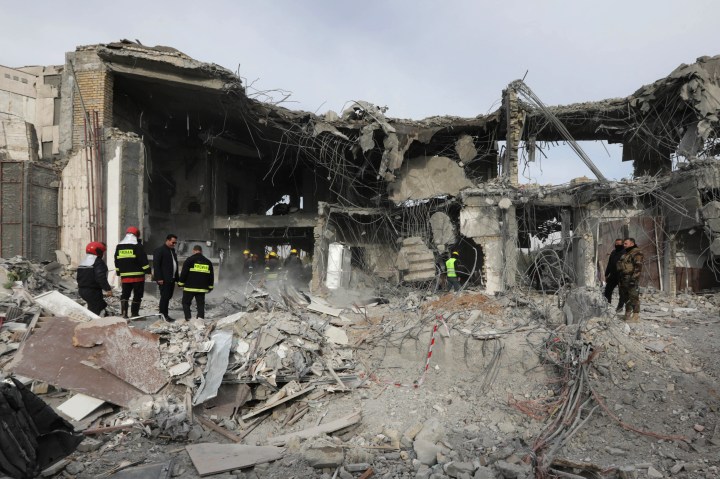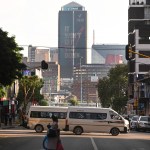MIDDLE EAST CRISIS UPDATE: 18 JANUARY 2024
Iran strikes separatist group in Pakistan; EU to sign off on sanctions targeting Hamas

Iran conducted a missile strike on a separatist group in Pakistan, sparking a diplomatic crisis between the neighbouring countries at a time of rising regional tensions.
The European Union is set to sign off on sanctions targeting Hamas leadership and the group’s financing as soon as Monday over its attack on Israel, according to people familiar with the matter.
The Biden administration will put Houthi fighters back on a global terrorism list, officials said, as the US looks to cripple its ability to fund Red Sea attacks that have roiled commercial traffic in a vital trade waterway.
A deal has been reached to deliver medicine and other humanitarian aid to residents of Gaza in exchange for medicine being provided to hostages held by Hamas since its 7 October attack on Israel, according to the government of Qatar.
Iran strikes Sunni group in Pakistan as regional tensions soar
Iran conducted a missile strike on a separatist group in Pakistan, sparking a diplomatic crisis between the neighbouring countries at a time of rising regional tensions.
Pakistan said it was recalling an ambassador to Iran and barring Tehran’s envoy from re-entering the country over the “unprovoked and blatant breach” of its sovereignty.
The attack marks a sharp escalation of Iran’s campaign against Jaish al-Adl, based in Pakistan. Iran’s Tasnim news agency said two bases belonging to the group in Balochistan province were destroyed late on Tuesday with missiles and drones.
Jaish al-Adl is a Sunni group that operates along predominantly Shiite Iran’s porous border with nuclear-armed Pakistan. It’s launched multiple attacks on Iranian security forces, most recently a December assault on a police station that killed 11 people. Iran and the US both consider it a terrorist group.
The strike came as tension rippled through the Middle East over the war between Israel and Iran-backed Hamas, which has been raging in Gaza for more than 100 days. The Houthi group in Yemen, also backed by Iran, has been escalating assaults on shipping in the Red Sea, drawing counterattacks from the US and its allies.
Pakistan, which said the strike killed two children and injured three others, became the second of Iran’s neighbours to complain of an attack by the Islamic Republic on its soil within 24 hours. Earlier on Tuesday, Iraq criticised a deadly Iranian missile hit on an alleged Israeli spy base in Iraqi Kurdistan.
“Pakistan reserves the right to respond to this illegal act,” the government said. “The responsibility for the consequences will lie squarely with Iran.”
EU set to hit Hamas with sanctions next week
The European Union is set to sign off on sanctions targeting Hamas leadership and the group’s financing as soon as Monday over its attack on Israel, according to people familiar with the matter.
The sanctions were agreed at a technical level and will be rubber-stamped by the bloc’s foreign ministers meeting in Brussels on Monday, the people said, speaking on condition of anonymity.
While Hamas already faces constraints as an EU-listed terror organisation, the EU is looking to add additional measures in response to the group’s attack against Israel on 7 October. The move would align the EU closer with steps already taken by the US. Monday’s approval was reported earlier by Politico.
Separately the EU is planning a naval mission to the Red Sea to escort commercial ships and protect them from attacks by Houthi groups.
US designates Houthis as terrorists after rise in Red Sea attacks
The Biden administration will put the Houthi fighters back on a global terrorism list, officials said, as the US looks to cripple its ability to fund Red Sea attacks that have roiled commercial traffic in a vital trade waterway.
The decision to classify the Houthis as a Specially Designated Global Terrorist organisation partly unwinds a move President Joe Biden made early in his administration revoking that and another terror designation as the US sought to ease the humanitarian crisis in Yemen after years of civil war.
But the US is now locked in a battle with the Houthis after the Iran-backed group began its string of attacks on commercial ships travelling through the Red Sea in response to Israel’s campaign against Hamas in the Gaza Strip. The US has responded with a series of airstrikes designed to deter the Houthis from launching further attacks and degrade its ability to attack shipping.
The administration could rescind the designation if the group halts its attacks, according to a senior administration official who briefed reporters on the pending designation. It will take effect in 30 days, the officials said, allowing the US to design sanctions in a way that avoids penalising ordinary Yemenis.
Wednesday’s move doesn’t include restoring the Houthis to a separate list of foreign terrorist organisations, which the official said would have far wider humanitarian consequences even as it would further restrict the group’s finances.
Israel-Hamas deal struck for aid to Gaza and hostages, says mediator Qatar
A deal has been reached to deliver medicine and other humanitarian aid to residents of Gaza in exchange for medicine being provided to hostages held by Hamas since its 7 October attack on Israel, according to the government of Qatar.
The supplies were to be flown into Egypt on Wednesday by the Qatari air force before entering the Gaza Strip, according to a statement from the Qatar Ministry of Foreign Affairs. The mediation was made in cooperation with France, the ministry said in a statement posted on X, formerly known as Twitter.
“Medicine along with other humanitarian aid is to be delivered to civilians in Gaza Strip, in the most affected and vulnerable areas, in exchange for delivering medication needed for Israeli captives in Gaza,” the ministry said.
Read more: Two-state solution needed to finance rebuilding Gaza, says Qatar
The US welcomed the announcement by Qatar. It would “deliver badly-needed medicine to the hostages held by Hamas in Gaza in the coming days”, Adrienne Watson, a spokesperson for the National Security Council, said in a statement. “We will continue to pursue every effort to secure the release of the hostages and reunite them with their families.”
Hostage relatives visited Qatar last weekend and raised concerns, for the first time, that family members held captive by Hamas were in need of prescribed medication, according to a diplomat briefed on the talks.
Qatar has expedited efforts — with Hamas and Israel — to get medicines to the hostages as well as Palestinians in Gaza, and mediators were now working to finalise the arrangement, the diplomat said.
Iran strikes showcase high-tech missiles that could reach Israel
A string of Iranian cross-border missile attacks showcased a new part of the Islamic Republic’s long-range arsenal for the first time with a weapon capable of hitting Israel directly.
The Islamic Revolutionary Guard Corps (IRGC) launched the precision-guided Khaibar-Shekan, or Khaibar-Breaker, ballistic missile this week in a 1,300km strike on Isis in Syria from southwestern Iran, the Tasnim news agency reported. That would make it the farthest such attack in the IRGC’s history.
The distance is almost identical to what would be required to hit Tel Aviv, and Iran has previously linked its development of the missile to a longstanding enmity with Israel. Iran has generally clashed with Israel via proxy groups, such as Hamas, rather than launch a direct attack.
Tehran claims Khaibar-Shekan has a 1,450km maximum range and that it can evade Israeli anti-missile defences.
Egypt grapples with impact of Red Sea hits on Suez Canal revenue
Egypt pushed ahead with an increase in transit fees through the Suez Canal this week, as a need for foreign currency trumped a fall in maritime traffic due to Houthi attacks on shipping in the Red Sea.
Revenue for the North African nation from the vital waterway — the shortest route between Asia and Europe — has slumped as some ships avoid the canal to protect themselves from missile and drone assaults. But rather than delay the long-planned hike, Cairo is betting additional income from those still transiting will help the cash-strapped economy.
Traffic volumes through the Suez Canal were down by 30% between 1 January and 11 January compared with a year earlier, according to canal authority head Osama Rabie, as the Iran-backed Houthis stepped up their attacks in response to Israel’s war against Hamas in Gaza, fuelling concerns of a wider military conflict.
Third commercial ship in a week struck by a drone near Yemen
Another commercial vessel was struck by a drone south of Yemen, the third such incident in as many days that’s underscoring the intensifying danger to vessels in one of the world’s most vital waterways.
The attack occurred about 97km southeast of Aden, Yemen, according to the UK Navy. The ship involved was a bulk commodity carrier, according to intelligence companies Ambrey Analytics and Diaplous, making it the third one of that kind to be struck this week.
Since late last week, the US Navy and a key trade body have been advising merchant ships that security in the southern Red Sea remains unstable and that it is advisable to avoid the area. That follows US and UK strikes on Yemen’s Houthi rebels, who have been attacking merchant shipping in protest over Israel’s continued war with Hamas.
More ships flag no link with Israel as Red Sea turmoil continues
Cargo ships are broadcasting that they are not connected with Israel in an effort to avoid Houthi attacks in the Red Sea.
At least 21 vessels were signalling that they have no ties with the country, or sending similar messages, in ship-tracking data compiled by Bloomberg on Wednesday. The majority of these ships were in the Red Sea and Gulf of Aden.
That was a marked increase from last week, in an indication that the shipping industry is increasingly alarmed about the dangers facing vessels transiting the vital waterway. Several owners have said they will no longer use the route, and coalition forces and a large shipping trade group have recommended that shippers consider avoiding an area at the southern end of the Red Sea. DM
Read more in Daily Maverick: Israel-Palestine War




















Comments - Please login in order to comment.